|
|
|
Sort Order |
|
|
|
Items / Page
|
|
|
|
|
|
|
| Srl | Item |
| 1 |
ID:
160443
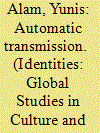

|
|
|
|
|
| Summary/Abstract |
This article is based on ethnographic research carried out in Bradford, an ethnically diverse city situated in the north of England. The sample of over 60 participants mostly comprises males of British Pakistani Muslim heritage but varies in terms other markers of identity such as social class, profession and residential/working locale. The article analyses the cultural value and meaning of cars within a multicultural context and how a consumer object can feed into the processes which refine and embed racialized identities. Small case studies reveal the concrete and discursive ways through which ideas around identity and ethnicity are transmitted and how, in particular, racialization continues to feature as a live, active and recognizable process in everyday experience.
|
|
|
|
|
|
|
|
|
|
|
|
|
|
|
|
| 2 |
ID:
120449
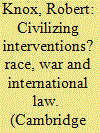

|
|
|
|
|
| Publication |
2013.
|
| Summary/Abstract |
Over the past decade there has been an explosion in literature on imperialism and international law. This scholarship has focused on the use of force, especially humanitarian intervention and the war on terror. These accounts foreground the issue of race, arguing that these legal arguments reproduce the dynamic of the civilising mission. This article argues that such analyses miss some key elements. Contemporary interventions must be counterposed to the First Iraq War, which was enabled through the uncontroversial authorization of the Security Council. Humanitarian intervention and the war on terror emerged in reaction to the fear that other states would veto Security Council resolutions. Consequently, the 'racial' discourse around intervention cannot simply be read as 'othering' the peripheries, but was also a response to inter-imperialist rivalry. The article then advances a conception of the arguments as an attempt to articulate hegemonic coalitions against emerging rivalries, and reads racialization in this light.
|
|
|
|
|
|
|
|
|
|
|
|
|
|
|
|
| 3 |
ID:
073666
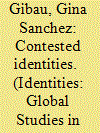

|
|
|
|
|
| Publication |
2005.
|
| Summary/Abstract |
This article presents the case of Cape Verdeans living in Boston, Massachusetts, as a community faced with the dilemma of constructing social identities within a racialized society. The Cape Verdean diaspora community of Boston is one that is fragmented into two distinct sectors of "Cape Verdean Americans" and "Cape Verdean immigrants." Through an analysis of "identity narratives," this article illustrates how Cape Verdeans' diasporic identity formation is constructed out of processes of negotiation and contestation. In determining whether Cape Verdeans living in Boston associate more with their cultural group or other larger racialized groups whom they resemble (e.g., African-Americans, Latinos), this article reveals how diasporic identities are not merely a given, but are a matter of heated debate. The Cape Verdean diaspora of Boston provides an interesting example of how immigrants of African descent are actively reshaping the boundaries of racial categories by creating a space for cultural differentiation. The self-identification practices of Cape Verdeans are not unlike those of many other racially and ethnically defined immigrants in the United States, who continue to relocate to the United States, permanently or temporarily, due to personal choice, economic necessity, political persecution, ecological escape, and familial reunification. This article demonstrates how racial and ethnic categories are expanding and thus challenging our common sense notions of race, ethnicity, and culture.
|
|
|
|
|
|
|
|
|
|
|
|
|
|
|
|
| 4 |
ID:
157950
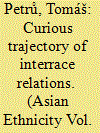

|
|
|
|
|
| Summary/Abstract |
This article aims to examine several interrelated issues pertaining to the historical development of pluralism in areas forming today´s Malaysia. Firstly, it intends to analyze the transformation of the formerly cosmopolitan populations of Malay port polities into the highly ‘racialized’ society of modern Malaysia. It also seeks to clarify the roots of ethnicity-based issues and relations in the country. Lastly, it attempts to challenge the very concept of Malaysia as a society primarily consisting of three ethnic pillars, dominated by the Malays, and ‘complemented’ by the Chinese and the Indians. I argue that the main driving force behind these tensions is the segregational colonial policies and the postcolonial arrangements of the Malay ethnocentrist governments, rather than ethnic and cultural factors as the ruling politicians tend to stress. I also contend that religious issues, especially those stemming from the dakwah movement, are gradually becoming an increasingly important factor in interrace strife.
|
|
|
|
|
|
|
|
|
|
|
|
|
|
|
|
| 5 |
ID:
168182


|
|
|
|
|
| Summary/Abstract |
Recent research has introduced the notion of fractal logic as a way of rethinking racialization and ideas and practices of nationhood. We have claimed elsewhere that racial reasoning instantiates a specific fractal logic called the nation in danger, which can be found in circulating images, soundbites, visual signs, metaphors, and narratives created in political communication, news media, and everyday conversations. In these studies, human reasoning is approached as fractals, which implies that the same structure appears self-similarly at different levels. This article examines the nation in danger as a basis for aggressive exclusionary reasoning and practices. Two Danish media events from 2016 are looked at: the segregation of swim classes and the new segregation of schools according to ‘nationality’ and ‘ethnicity.’ By using fractal logic, the nation in danger operates recurrently at different levels and, consequently, constitutes a form of naturalization of the white nationalism that saturates Danish racial reasoning and public debate.
|
|
|
|
|
|
|
|
|
|
|
|
|
|
|
|
| 6 |
ID:
185497
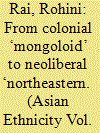

|
|
|
|
|
| Summary/Abstract |
Contemporary India has witnessed a rise in racism discourse, central to which are people from North-East and Himalayan regions, collectively referred to as ‘Northeasterns’. This has recentred ‘race’ and racism as being a theoretical-political problem of contemporary India itself. However, existing literature shows that there is stark under-theorisation of ‘race’ and racism in Indian context. Drawing from ethnographic research and applying the racialization approach, this paper argues that ‘race’ in India is a postcolonial-neoliberal construct, whereby colonial ‘Mongoloid’ is reconstructed into neoliberal ‘Northeastern’, such that ‘race’ in India acts as a layered mode of constructing identity and difference. It further argues that the ‘Northeastern’ category emerges as a result of exclusion from the ‘Indian’ category, which itself is racialized along Hinduised-Aryanised lines, such that racism is a product of a postcolonial centre-periphery power-relation between India and its North-East; thereby making way for critical ‘race’ scholarship in the Indian context.
|
|
|
|
|
|
|
|
|
|
|
|
|
|
|
|
| 7 |
ID:
101441


|
|
|
|
|
| Publication |
2010.
|
| Summary/Abstract |
Recent waves of new immigration distinct from postcolonial-era migrations can be identified in many Western countries. More than 40 such "new immigrant" candidates contested the 2009 local government elections in the Republic of Ireland. This article draws on interviews with just under half of these and on official responses from each of the Republic's five political parties to a study of "new immigrant" participation in Irish politics. It also draws on a specific locality case study of the border town of Dundalk where support for Sinn Fin, Ireland's most distinctly ethno-nationalist political party, is relatively high. Our analysis of "new immigrant" candidate participation in Irish politics suggests that a number of factors influence responsiveness to these; this article focuses on the salience of theories of racialization, ethnic nepotism, and localism. In particular, the findings emphasize how local identities as manifested by immigrant candidates potentially mediate racial and ethnic barriers.
|
|
|
|
|
|
|
|
|
|
|
|
|
|
|
|
| 8 |
ID:
177976
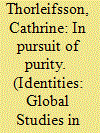

|
|
|
|
|
| Summary/Abstract |
Based on multi-sited fieldwork amongst leaders and supporters of populist radical right parties in the UK and Hungary, this article examines how the boundaries of the nation were reinforced and reimagined in the context of the ‘refugee crisis’ in 2015. Examining processes of racialization propagated by the UK Independence Party (UKIP) and the Hungarian Jobbik party, it suggests that the figure of the Muslim migrant served to rejuvenate violent imaginaries of ethno-racial and religious-civilizational difference. UKIP did not seek to reinforce national identity around a whiteness that was explicitly racially marked, but rather referred to culture grounded in (Judeo) Christian civilization as a basis of inclusion and exclusion. In contrast, in Hungary, supporters emphasized ethnic criteria for inclusion, thus challenging the basic values and principles underlying liberal democracy. In both contexts, anti-immigration discourses claiming the protection of ethno-racial or cultural purity, served a similar function; to re-territorialize white identities.
|
|
|
|
|
|
|
|
|
|
|
|
|
|
|
|
| 9 |
ID:
185954
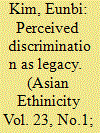

|
|
|
|
|
| Summary/Abstract |
In this study, we examine how Korean immigrants employed at co-ethnic multinational enterprises (MNEs) perceive their work experiences based on their past employment in the USA. Using 63 in-depth interviews conducted from June 2012 to December 2014, we found that Korean immigrants have different job attitudes and career prospects depending on their experiences of workplace discrimination in the USA. The findings suggest that immigrants who previously worked in the mainstream economy have developed a higher level of racial/ethnic awareness through racialized experience than their counterparts who only worked for co-ethnic employers. Such disparities in awareness shape the workers’ job attitudes and their career prospects. We conclude that the knowledge on the host society’s racial/ethnic stratification, once established, comes into effect continuously in immigrants’ lives and strongly influences the immigrants’ attitudes toward their socioeconomic incorporation.
|
|
|
|
|
|
|
|
|
|
|
|
|
|
|
|
| 10 |
ID:
186112
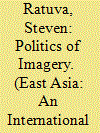

|
|
|
|
|
| Summary/Abstract |
The weaponization of racialized imagery has been a common feature of geopolitical contestation in contemporary history. The paper critically examines the historical genesis of Sinophobic narratives, which have been common features of the big power geopolitical contestation in the Pacific. The globalization of capitalism in the nineteenth century and the West’s attempts to penetrate the Chinese market and exploitation of its resources led to tension, skirmishes and wars. The myth of racial European superiority and corresponding inferiority of the Chinese was weaponized as an ideological justification for colonial domination, exploitation of cheap labour and appropriation of China’s resources and wealth. In recent years, the Sinophobic paranoia has been exacerbated by China’s Belt and Road initiative, a strategy at global economic and technological supremacy to counter the West’s dominance. This competition for global hegemony is played out in various parts of the world and the Pacific included. The paper critically discusses various historical factors associated with Sinophobia in the context of the USA, France and Australia and how these have influenced these countries’ contemporary approaches to Chinese expansionism.
|
|
|
|
|
|
|
|
|
|
|
|
|
|
|
|
| 11 |
ID:
190309
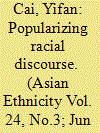

|
|
|
|
|
| Summary/Abstract |
The rise of social media has enabled Chinese migrants in the global south to participate in the production of racial knowledge from grassroots perspectives, adding complexity and dynamism to the racial discourse that was dominated by political and intellectual elites historically. This study investigates anti-black racial discourse on the popular short-video and live-streaming app in China, Kuaishou, where many Africa-based vloggers share their daily life experiences. This study examines the visual and verbal representation of Africans, focusing on 50 short videos posted by Africa-based Chinese and the comments made on them. The analysis shows that the racialization of Africans on Kuaishou is a multilayered process shaped by the intersection of race with other dimensions of identity, including class, gender, and nationality. This paper further illuminates the cultural embeddedness of these thoughts in a South-South setting, and discusses the impacts of different historical-ideological resources on racial thinking in the Chinese context.
|
|
|
|
|
|
|
|
|
|
|
|
|
|
|
|
| 12 |
ID:
117693
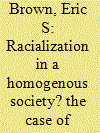

|
|
|
|
|
| Publication |
2013.
|
| Summary/Abstract |
This paper examines the puzzling status of Buraku people in Japan through the methodological prism of historical sociology. I develop a theoretical approach that emphasizes the concept of racialization to illuminate the historical and social construction of Buraku status. I propose this approach as a complementary alternative to prior analytic perspectives. Two major perspectives have dominated research on the status of Buraku people. First, an earlier approach that focused on the legacy of caste discrimination. The second framework focuses on Buraku people as part of the struggle for universal human rights. This article raises three basic, but interrelated questions about the historical development of Buraku status in Japan. Why did the Buraku people become subject to such overt discrimination in local community life, and through government policy? How was the state involved in the social construction of Buraku people? How did the Buraku liberation struggles challenge formalized discrimination?
|
|
|
|
|
|
|
|
|
|
|
|
|
|
|
|
| 13 |
ID:
122818
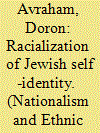

|
|
|
|
|
| Publication |
2013.
|
| Summary/Abstract |
While excluded from society and subjected to discrimination under government measures, German Jews under the Nazi regime during 1933-38 had conducted a public discourse regarding their collective identity. Acknowledging the failure of emancipation, Zionist and Orthodox Jews used racial vocabulary and concepts to produce an independent stance and to define political ends. Such an effort, however, did not begin during the 1930s. It was a reinforcement of racial ideas prevalent among German Jewish scientists since the late 19th century. In the 1930s, though, this "racialization" turned into a popular one, thus forming Jewish public opinion and political aspirations. It functioned as a means to respond to the inferior racial status and exclusion imposed on German Jewry by the Nazis.
|
|
|
|
|
|
|
|
|
|
|
|
|
|
|
|
| 14 |
ID:
177969
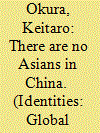

|
|
|
|
|
| Summary/Abstract |
Foreigners who arrive in the United States experience a process of racialization by which they adjust to the new racial realities of their host society. This paper presents a unique longitudinal study of racialization, drawing upon 30 interviews with 15 Chinese international students conducted twice per respondent over six months. The first interviews were carried out within two weeks of the students’ arrival in the U.S. to capture their pre-migration racial schemas and racial identity. Upon their arrival in the U.S., Chinese students primarily understand the concept of ‘race’ through the paradigm of nationality and racially identified as Chinese. Just half a year later, however, there was a striking shift towards a conceptualisation of race that emphasises phenotype over nationality, and some respondents began to identify with the pan-national racial label ‘Asian.’ I argue that these changes can be attributed to the process of racialization in the United States.
|
|
|
|
|
|
|
|
|
|
|
|
|
|
|
|
| 15 |
ID:
185616
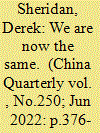

|
|
|
|
|
| Summary/Abstract |
Many accounts of Chinese migration in Africa compare China to “the West.” However, lived historical experiences, social hierarchies and moral mappings of the division of labour have mediated how different peoples in different contexts have received, interacted with and given meaning to Chinese migrants. In Dar es Salaam, Tanzania, Tanzanians talk about so-called Chinese “wamachinga” (petty traders) who have complicated long-standing ideas about “African” and “non-African” roles in the economy, and who have both opened and closed opportunities for different African traders. Based on ethnographic fieldwork in the key Tanzanian wholesale market of Kariakoo, I examine how the entry of Chinese goods and traders has been associated with shifting local economic hierarchies. I argue that debates over the presence of Chinese traders are less about “China” than about the politics of which roles belong to whom in a hierarchical division of labour.
|
|
|
|
|
|
|
|
|
|
|
|
|
|
|
|
| 16 |
ID:
175166
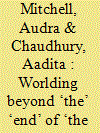

|
|
|
|
|
| Summary/Abstract |
We often hear that the ‘end of the world’ is approaching – but whose world, exactly, is expected to end? Over the last several decades, a popular and influential literature has emerged, in International Relations (IR), social sciences, and in popular culture, on subjects such as ‘human extinction’, ‘global catastrophic risks’, and eco-apocalypse. Written by scientists, political scientists, and journalists for wide public audiences,1 this genre diagnoses what it considers the most serious global threats and offers strategies to protect the future of ‘humanity’. This article will critically engage this genre to two ends: first, we aim to show that the present apocalyptic narratives embed a series of problematic assumptions which reveal that they are motivated not by a general concern with futures but rather with the task of securing white futures. Second, we seek to highlight how visions drawn from Black, Indigenous and People of Color (BIPOC) futurisms reimagine more just and vibrant futures.
|
|
|
|
|
|
|
|
|
|
|
|
|
|
|
|
| 17 |
ID:
153675
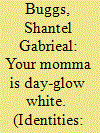

|
|
|
|
|
| Summary/Abstract |
This article utilizes discourse analysis and an auto-ethnographic approach to explore the impact of US racial and ethnic categorization on the experiences of an individual marked as ‘mixed-race’ in terms of individual identity and familial/cultural group loyalty and obligation(s). This essay focuses on an incidence of public policing through the popular social networking platform Facebook, centring on the invocation of racial obligation by white friends and family members. I analyse how racial loyalty is articulated by friends and family members in their posts on my personal Facebook page and how this ‘loyalty’ is used as means of regulating my mixed-race identity performance. This essay aims to understand several things, namely how identity is mediated through the invocation of racial obligation and how tension around identity plays out in the multiracial family.
|
|
|
|
|
|
|
|
|
|
|
|
|
|
|
|
|
|
|
|
|